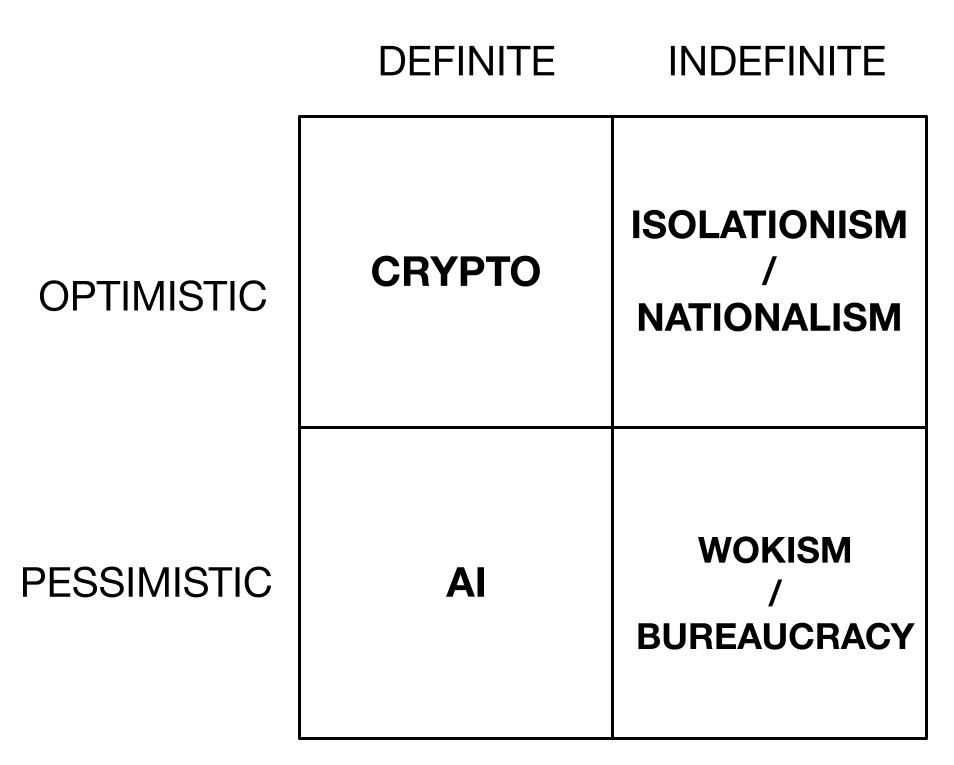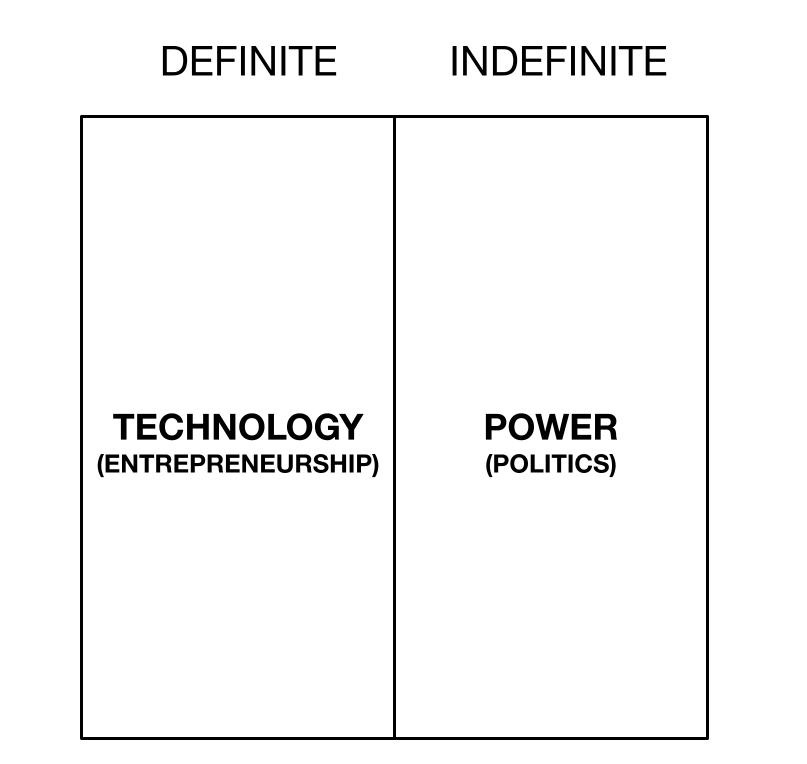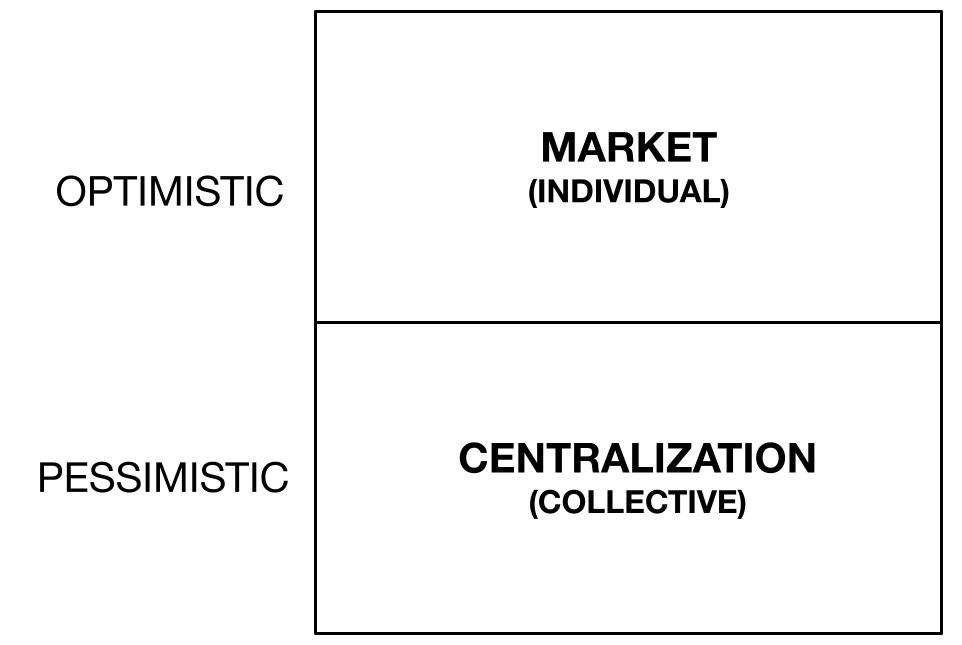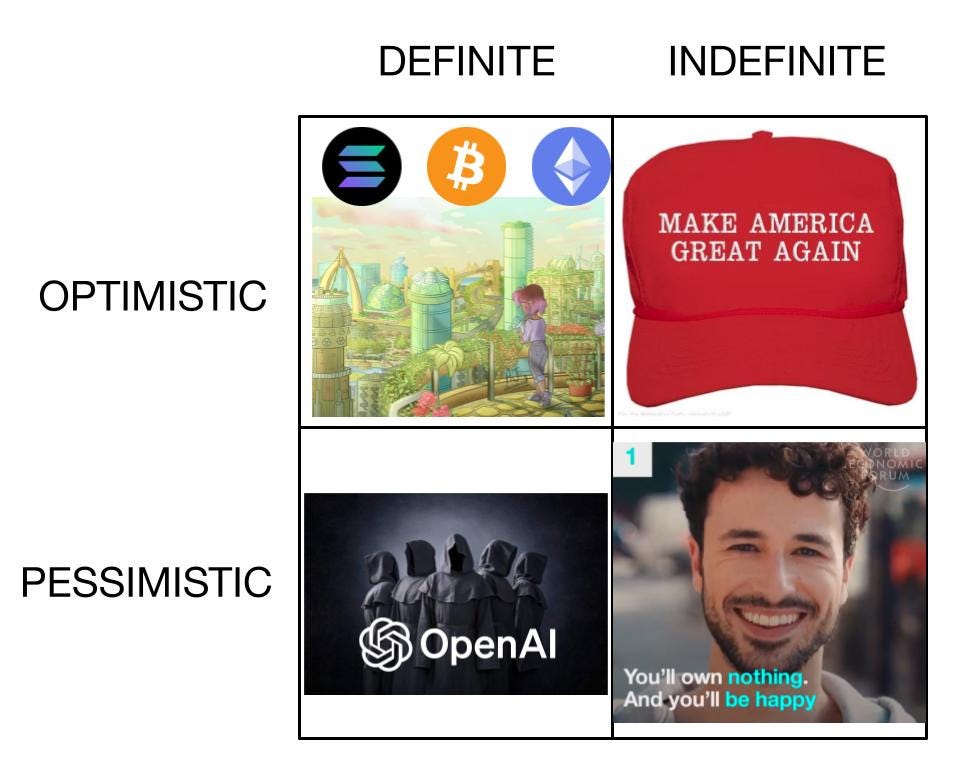The Optimistic Crypto Pitch
The Peppy Side Of Things
Crypto is seen as many things: nerdy extravagance, monetary anarchism, delusional broscam and a few other labels. The crypto industry today is far from the libertarian dream it used to be when it was just Satoshi and a handful of cypherpunk computer scientists. Crypto has undergone startupization and grown ideologically diverse.
And as it happens, the biggest enemies are not the heretics - the nocoiners, but those who dare to bastardize my scripture. Bitcoincers hate Ethereum folks, ETH folks don’t like the Solana crowd. I’m exaggerating for a good reason. Good to keep in mind that it’s usually the intolerant minority that is the most vocal. But the conflict is obvious - it’s not the coin vs nocoin, it is one coin against the other.
Talking about conflicts does not sound optimistic but it just shows how this subculture copies religious conflicts of the past (and the present). If crypto is a religion it is the one that is centered around monetary, financial and commercial revolution. The gods are fungible, narratives flexible and financial expectations expandable. Crypto replaces the “in God we trust” with “in our Coin we trust”.
Optimism
The optimism I’m alluding to is about an individual who understands his or her ability to transform the world as a superpower and embraces this to harness energy from the brutish nature that he was born into.
The optimist is prone to experimenting and takes risks on his behalf. The optimist loves liberty and despises tyranny. But when the optimist despises something he does so with a skin in the game. He takes the opposing bet because he knows that, as Celine wrote; “when men can hate without risk, their stupidity is easily convinced, the motives supply themselves.”
The optimist does not feel the urge to govern on behalf of others, he understands he is often wrong but tries nonetheless. The optimist takes his chance to explore, create and rebuild the world to his image. The optimist understands that ever-expanding knowledge is the string of life, enabling his offspring to scrape the old and follow new ideas.
The optimist understands that resources are not the limit but the opportunity as the ideas give power to resources, harnessing the surroundings into energy that serves him. The optimist embraces change and sees it as imperative to moving forward.
How does this optimism connect to the crypto pitch? The fact that at the beginning of this all was a man who was able to envision a world in which governments do not control monetary matters as a better world is the deeply optimistic origin of crypto.
Not because governments are evil but because they are susceptible to corruption. And that’s not because people are evil either. Institutions are prone to power grabs the longer they govern their community. After a while, they start to look inward and serve primarily to themselves. Why?
Because as they age they become less relevant with their dogma being static and the world moving forward. But they want to survive. They cling to relevance. Suddenly, the world serves them and they do not serve the world anymore. And to survive they need to exert more power at the cost of the community they govern.
The original crypto idea – bitcoin, was about exerting less power, relying not on a monopoly on violence but an immutable code in the cloud. Foolish dream. Yet it worked. The optimistic experiment is now worth trillions of dollars. Today it’s not only bitcoin. It’s much more.
Cryptos
The ups and downs in crypto are very apparent. The higher the high the more painful the comedown. Some rules of nature apply to financial markets as well. And human spirit too. There’s always something happening as crypto never sleeps.
The shills and the critics can’t agree if memecoins are good or evil, with some succumbing to the price action. They also can’t reconcile if the VC-funded coins that drop on the market at insane valuations are going down before or after they release an MVP.
Investors hop from narrative to narrative, funding things that either won’t work or can’t work or no one will ever use if they do work. Most things will go to zero. F***ing zero. And that’s fine. - “Wait what? I came here for the optimistic crypto pitch.”
Medium is the message. Memecoins are a medium, crypto is a medium, and human behaviour just plays out in a new way as the novel technology enables it. And things going to zero is a part of that game.
It is fine that things go to zero because crypto is still the most optimistic technology movement in the world. Every technological and cultural revolution enables exploitation exactly because it’s revolutionary. This opens up the information asymmetry that people are quick to (mis)use to their advantage.
But at the end of the day, in crypto, people are taking matters into their hands, trying to solve governance problems (woefully failing), trying to build new internet, credibly neutral payment rails, new physical infrastructure for various funky use cases, fund research project that don’t get funded elsewhere, hustling with culture monetization, attaining generational wealth before releasing a product adopted by more than 1000 users, building casinos that become alternative financial products, attempting to build new cities and defy death. Most of this is misguided perhaps. But it shows the great spirit crypto offers.
Crypto is Wild West meets Las Vegas, it is the frontier where you can become rich overnight but you’re more likely to lose your net worth getting scammed by a sex worker. It is a place where dreams come true, land is to be claimed, wealth is gambled away and conflicts are daily.
The Pessimists And The Optimists
For years I have carried Peter Thiel’s simplified 2x2 optimism versus pessimism framework in my mind. When you have a hammer everything… Thiel makes a distinction between definite and indefinite forms of both pessimism and optimism.
He writes: “If you treat the future as something definite, it makes sense to understand it in advance and to work to shape it...if you expect an indefinite future ruled by randomness, you’ll give up on trying to master it.”
Indefinite pessimists “just react to events as they happen and hope things don’t get worse...the indefinite pessimist can’t know whether the inevitable decline will be fast or slow, catastrophic or gradual. All he can do is wait for it to happen”.
Definite pessimists are “obsessed with the way in which things threaten to get worse...believes the future can be known, but since it will be bleak, he must prepare for it”.
An indefinite optimist sees a better future but he doesn’t know how to get there. And finally, a definite optimist, sees an improved future so he plans and works to make it so. So this is my simplified version of applied to narratives that dominate my Twitter feed:
I frame politics vs tech as a vertical dividing line between definite and indefinite. This is because politics is not about wealth creation but about governing and distribution. At best, good politics is an enabler of technology and entrepreneurship. But on its own - it does not create the future. Technology does. It is a substrate on which society unfolds and a network facilitating the exchange of information between humans.
The horizontal dividing line is about the role of an individual versus the role of the collective. The optimists emphasize the above-mentioned individual who becomes the foundation. It is more about the bottom-up emergence of change and robustness through decentralization. Whereas the pessimists see the world as fragile and want to rely on top-down enforcement of control. Only they can fix things (through power) so things don’t get worse.
Let’s start with the definite pessimism of the AI narrative. It’s definite because it relies on a technological paradigm. Why pessimism? At the centre of this narrative is the machine as something greater than the human itself. It's a novel interpretation of God that speaks to mortals through a chatbot. The centralized algo to rule them all. And we’re at the mercy of this technology.
It’s either certain death by this superior being or maybe we can work on the alignment scripture. AI as “Abrahamic interpretation” rather than artificial intelligence. A human becomes a mere subject. There’s nothing we can do, we can’t stop it only to yield and hope we don’t get annihilated by this ferocious force.
The other pessimists, the indefinite ones, are the woke. The ones who think everything has been invented and now we can only redistribute. At the centre of this interpretation is power. Leverage power to distribute from powerful to powerless. There’s nothing else that can be done, capitalism has failed and we can only freeze humanity, govern with the cold hand of bureaucracy that forces us into the misery of paper straws.
The human is the culprit. Nature is the victim. The poor are the victims. The winners are the perpetrators. The only way is if we all lose equally. There’s nothing left just to promote surface diversity and idea homogeneity, done so by the people to whom the rules don’t exactly apply because they are here to deliver us from the original sin. The world is finished, stop using the energy for progress because the only progress is the equality of misery.
Now moving on to the indefinite optimists of “hey, things have not worked out this way, so we should go back and fix things.” But how? Going backwards is not the way. The path forward is unknown. Embracing nationalism? Sure, it works for cultural cohesion, but the scale transformation property of patriotic individuals could translate into an annihilation machine.
Indefinite optimism refuses the homogeneity of globalism and nonsensical bureautic overload but is confused about the transformation of new technological realities. It feels threatened and could be prone to close-mindedness. It does not know how to embrace the technology that is the substrate on which society functions.
Ban social media? Is it the same as banning the printing press? The Reformation has started and stifling it will ultimately backfire. How to take matters into one’s hands to work towards a specific version of the future?
The Definite Optimism Of Crypto
If you have been around crypto for a while you know it’s a mess. Absolute mess. But the chaos, the hustle, and the energy of misguided technorevolution are the result of a strong desire to take matters into one's own hands.
It starts with finance because the market is the resource-controlling machinery. If we change the structure we can divert the flow of value into things boomers would not dare. They like things how they are. Crypto does not. It wants change but does not rely on mere protesting. It builds. It takes risks. It does not want to occupy the Wall St. It wants to free it.
Crypto is solarpunk. Crypto is about financial freedom, decentralized cities, and funding scientific experiments. Crypto is the disobedient naughty child. Albeit naive on the surface, the decentralized and credible neutral money free of corruption and political bias is a substantial technological revolution. It liberalizes funding. It ignores the politics of alarmism. Did the world get safer with the tyranny of KYC and AML or did the inverse happen?
Crypto creates a new asset class that enables wealth transfer from the incumbent generation. Housing is unaffordable, so crypto creates new games to get around the bureaucratic machinery preventing young people from owning anything and getting ahead in life. It refuses to “own nothing and be happy”. It wants to own everything and be miserable. But be miserable on its own terms.
Yes, we launch valueless NFTs. Yes, we drop overvalued tokens on clueless retail. Yes, we technobabble to save our lives. Yes, we fund utterly useless things. Ultimately, this is the revolution. No one promised you it was going to be nice.
We claimed the digital world, created new rules and started new games. It’s not perfect but we’re on a mission. Embracing the individual and finding novel means to do finance and commerce. These might be quirky experiments but there is a vision that understands money is the capacity for change.
We move slowly, one success at a time. Bitcoin. Ethereum. ICOs. Uniswap. Solana. What’s next? Bio.xyz? HairDAO? Most will fail on the frontier. But it’s the very few that will survive that will make a global impact. We are embracing the asymmetry of the outcome.
And yes, crypto is the true frontier. You don’t need a list of credentials to make a dent in this world. A few lines of code can go a long way. Terrible ideas are launched to the moon (and back). But the good ideas too. And we need more of those.
So if you’re not in crypto then you should come and join the clowns, scammers and pilgrims. There’s a lot of money to be made and fortunes to lose. We fund truly miserable endeavours.
We always need new people to help us move through a sticking point. We can’t rely on divine intervention to move forward because we become indefinite optimists. We need new ideas and bold execution to remain the most definite optimist movement on this planet.
It will not be the boomers buying bitcoin and Ethereum ETFs. It will be the nocoiner normies who venture into the frontier, find inspiration and build against all odds. That’s the spirit driving crypto forward.
This is a spiritual sequel to “Why I’m Less Than Infinitely Hostile To Crypto” and “Casino On Mars”. You should read those too if I have not convinced you that crypto is a fruitful endeavour.






Loved reading that! Don’t have that much time for crypto nowadays, but this was time well spent :)
I loved reading this article. enjoyed it